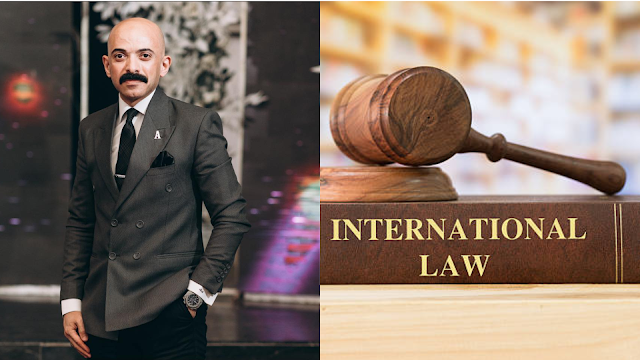The well-known Egyptian politician and judge, Ahmed Abd ElRady Thabet spoke about the importance of teaching international law in Arab and international universities to integrate the culture of local and international societies.
international law
It is a set of legal rules that regulate the relationship between states or between the state and people as a sovereign personality, and it is divided into internal public law and external general law.
According to Professor Stark's definition in his book Introduction to International Law: it is a set of legal rules that largely consist of principles and rules that control the behavior of the state, and it feels obligated to observe them, and therefore respects them in its mutual relations, which also includes: legal rules related to individuals and units that They are not states but the rights and duties of these individuals and units are the concerns of international groups.
In fact, some difficulties arose in defining the term international law, as this term was used for the first time by Jeremy Bentham in 1870 AD in his book: “Introduction to the Principles of Ethics and Legislation.” This term replaced another old term, which is “the law of nations” or what It is called in French: “People’s Law”.
Oppenheim traditionally defined international law as "a set of customary rules and treaties that states consider binding law in their relations with each other."
The scope of this law revolves around two main branches: the law of nations and the law of peoples, and international agreements and treaties are international agreements and treaties, and they are two different branches in terms of theoretical foundations and should not be confused.
Nor should public international law be confused with private international law, as international law pertains to resolving disputes between laws. In general, international law “consists of laws and principles of general application and deals with the actions of states and international bodies and their mutual relations as well as their relations with natural or legal persons.”
Public international law has three basic sources: international treaties and agreements, customs and traditions, and general rules of law. In addition to judicial decisions that may apply as subsidiary methods to determine the law, as referred to in Article 38 of the International Court of Justice Law. International treaties consist of duties and obligations that states willingly agree to among themselves in those documents. Customs and traditions derive from the continuous and accepted practices among countries, i.e. the conviction of countries that continuous practice turns into legal obligation. Decisions of international courts and legal studies were also taken as convincing sources for international norms and laws. There were attempts to codify and write international norms after World War II, through the
establishment of the International Legal Commission under the supervision of the United Nations. As for the general rules of law, they are those laws that are generally recognized from the major legal systems in the world. Some rules of international law can reach the point of being obligatory (jus cogens) so that they apply to all countries without any exceptions.
Public international law sets a framework and criteria for defining states as primary representatives in the international legal system, and since the existence of a state entity presupposes the existence of control and jurisdiction over the region, public international law deals with the acquisition of the region, the immunity of the state and the legal responsibility of states in their actions with each other. Public international law is also concerned in some way with dealing with individuals within state
borders. Therefore, there are systems that include with the rights of minorities, the treatment of
foreigners, the right to political asylum, international crimes, problems of nationality, and human rights in general. It also includes the functions of maintaining world peace and security, arms control, peaceful settlement of disputes, and regulating the use of force in international relations. Even if the law could not stop the outbreak of war, it did develop principles and laws to govern hostile conduct and the treatment of prisoners of war. International law also governs matters relating to the global environment, and common international matters such as international waters, outer space, international communications and international trade.



Comments
Post a Comment